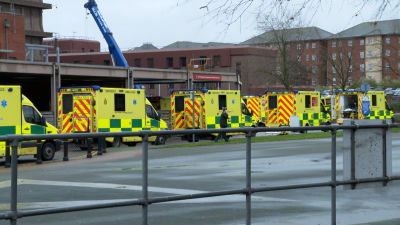The scale of ambulance delays in the South West - and what's causing them

Nearly a third of ambulances arriving at hospitals across the South West are facing handover delays of at least half an hour.
Data released by NHS England shows of the 10,000 ambulances which arrived at the region's hospital so far this year, 30 per cent faced delays of 30 minutes or more.
A handover delay does not always mean a patient has waited in an ambulance. They may have been moved into an A&E department, but there were no staff available to complete the handover.
The data - which runs up to January 9 - shows 12% of all ambulances faced handover delays of between 30 and 60 minutes while a further 19% were delayed for more than an hour.
University Hospitals Bristol and Weston (UHBW) NHS Foundation Trust - which runs Bristol Royal Infirmary and Weston General Hospital - is among the worst hit NHS Trusts in England.
Last week - January 3 to January 9 - 287 ambulances arriving at the two hospitals experienced delays of at least an hour.
The trust's interim medical director Dr Emma Redfern apologised to people who have experienced waits and said patient safety is its "priority".
She also told ITV News its hospitals are under "sustained pressure" and said staffing challenges, Covid patients and coronavirus infection control measures are impacting admissions.
More than half of ambulances arriving at University Hospitals Plymouth (57%) and Royal United Hospital Bath (52%) in the same week experienced at least 30-minute delays.
South Western Ambulance Service statement
A spokesperson for the South Western Ambulance Service NHS Foundation Trust (SWAST) said: “We’re sorry that some patients are having to wait longer for an ambulance as a result of health and social care being under severe pressure.
"The most significant impact is the length of time it’s taking us to hand over many patients into busy hospitals, which is higher than we’ve ever seen before.
"It’s an absolute priority for us and for our NHS partners to reduce these delays, so crews can get back out on the road for other patients.
"Our people are working incredibly hard day and night to enable us to be there for our patients, while prioritising those who are most seriously injured and ill."
Medically fit patients who are unable to be discharged from hospitals - so-called 'bed blockers' - are also adding pressure to hospitals.
Dr Redfern, from UHBW, said: "Family and friends of patients can also help by being ready to collect their loved one from hospital when we call, and supporting them when they get home.
"We would like to apologise to any of our patients who have experienced a longer wait at our emergency departments."
'Staff aren’t machines'
NHS national medical director Professor Stephen Powis called on people to get vaccinated, saying Omicron has increased the number of people in hospital with Covid and drastically reduced the number of staff who are able to work.
"Despite this, once again, NHS staff pulled out all the stops to keep services going for patients," he said.
"There have been record numbers of life-threatening ambulance call outs, we have vaccinated thousands of people each day and that is on top of delivering routine care and continuing to recover the backlog.
"But staff aren’t machines and with the number of Covid absences almost doubling over the last fortnight and frontline NHS colleagues determined to get back to providing even more routine treatments, it is vital that the public plays their part to help the NHS by getting your booster vaccine, if you haven’t already."
How many ambulances were delayed at South West hospitals?
The data below shows a breakdown of the number of ambulances delayed for at least 30 minutes at NHS trusts across the South West between January 3 and January 9.
It also shows what percentage all of ambulances arriving at the hospitals had to wait for at least half an hour.
Dorset County Hospital NHS Foundation Trust: 6 ambulances (2% of total)
Gloucestershire Hospitals NHS Foundation Trust: 351 ambulances (48% of total)
Great Western Hospitals NHS Foundation Trust: 139 ambulances (28% of total)
North Bristol NHS Trust: 126 ambulances (22% of total)
Northern Devon Healthcare NHS Trust: 40 ambulances (13% of total)
Royal Cornwall Hospitals NHS Trust: 210 ambulances (43% of total)
Royal Devon and Exeter NHS Foundation Trust: 26 ambulances (4% of total)
Royal United Hospitals Bath NHS Foundation Trust: 252 ambulances (52% of total)
Salisbury NHS Foundation Trust: 39 ambulances (14% of total)
Somerset NHS Foundation Trust: 86 ambulances (17% of total)
Torbay and South Devon NHS Foundation Trust: 212 ambulances (48% of total)
University Hospitals Bristol and Weston NHS Foundation Trust: 441 ambulances (64% of total)
University Hospitals Dorset NHS Foundation Trust: 106 ambulances (12% of total)
University Hospitals Plymouth NHS Trust: 333 ambulances (57% of total)
Yeovil District Hospital NHS Foundation Trust: 22 ambulances (7% of total)